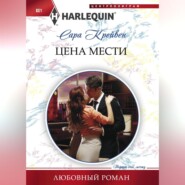По всем вопросам обращайтесь на: info@litportal.ru
(©) 2003-2024.
✖
Counterfeit Bride
Автор
Год написания книги
2018
Настройки чтения
Размер шрифта
Высота строк
Поля
‘Tell me,’ he said, ‘those dark glasses—surely you don’t need them in the evening. I hope there is nothing the matter with your eyes.’
‘Oh, no,’ she said calmly. ‘I’ve just been advised to wear them all the time for a short while.’ And that, she thought with satisfaction, was nothing less than the truth.
‘A pity,’ he said. ‘One can learn so much about a woman from her eyes.’
She said sweetly, ‘And about a man, señor.’
His mouth quivered slightly. ‘As you say,’ he agreed.
It was pleasant, looking out into the darkness with the scent of the flowers wafting to them on the night air, and hearing the distant splash of water from the fountains interspersed with the bursts of laughter and conversation all around them. Nicola had to suppress a little sigh. She would have other memories to take with her, apart from ancient pagan artefacts, when she came to leave Mexico. She was conscious of a feeling of recklessness, and decided it would be wiser to stick to fruit juice for the remainder of the evening.
She tried to remember everything Teresita had told her about Ramón. There wasn’t a great deal. He lived at the hacienda La Mariposa and ran the cattle ranch for his cousin. His mother, Doña Isabella, and his sister Pilar lived there too, and Teresita had said he was ‘kind.’ Nicola had got the impression that Teresita would not have applied the same epithet to his mother and sister, however, even though there had only been that one meeting all those years ago.
She had asked Teresita why the hacienda was called La Mariposa—the Butterfly, but Teresita had simply shrugged vaguely and said it was just a name.
Anyway, what did it matter? Nicola told herself. She wasn’t going to the hacienda, but to Monterrey, and none of the Montalba residences would be available for her inspection.
She wondered what Ramón would say when he realised how he had been fooled, and whether Don Luis would be very angry with him. She stole a glance at him. The arrogant set of his jaw indicated that he might have quite a temper himself.
It was a delicious meal. He had ordered chicken for them cooked in a sauce made with green peppers and a variety of other tantalising flavours she didn’t have time to analyse. And, in spite of her protests, there was wine, one of the regional varieties, cool and heady.
And she sat across the table from him, hiding behind her dark glasses, and weaving silent fantasies where she was no longer playing a part, but was herself, Nicola Tarrant, free to talk, to smile, to laugh and enjoy herself in his company.
Because in spite of her instinctive wariness of him, in spite of the strain of having to maintain a conversation not in her own language, she was enjoying herself. It was a pleasant sensation to encounter covertly envying glances from other women, to notice the deferential service they received from the staff. Some tourists at a nearby table were sampling tequila for the first time, getting in a muddle over the salt and lemon juice amid peals of laughter, and Nicola smiled too as she watched, her fingers toying with the stem of her wineglass. She looked at her companion and saw that he shared her amusement, and the moment seemed to enclose them in a bubble of intimacy. His hand was very near hers. If he moved it as much as an inch, their fingers would brush. Nicola took a deep breath and moved, picking up her glass and pretending to drink.
She was playing a dangerous game with this crazy charade she had embarked upon, but in a way it might prove to be her salvation. As Nicola Tarrant, she could be fatally tempted to respond to any further advances he might make. As Teresita, she could not be.
All the same, she found his attitude a puzzling one. Teresita had given her the impression that Ramón was Don Luis’ trusted and highly regarded employee as well as cousin. She would have supposed that under those circumstances he would have treated his cousin’s future wife with the greatest respect. Perhaps he was a man who could not resist a flirtation with any attractive woman who crossed his path, she thought, conscious of a vague feeling of disappointment. Or maybe there was some deeper, darker motive for his behaviour. Perhaps he secretly hated Don Luis, or out of loyalty to him was testing his novia’s virtue to make sure she was a worthy bride for a Montalba.
She wondered wryly how the shy, unworldly Teresita herself would have made out on this journey. Would she have even recognised the kind boy she remembered from her childhood? Or would the predator in him have been defeated by her gentleness? After all, Cliff had not been a model of rectitude before he began to associate with Teresita, but now he was tenderly protective towards her.
Some musicians had appeared and were moving among the tables, playing guitars and singing. Nicola recognised the tune they were playing. It was a love song, which had been popular in Mexico City only a few weeks earlier, and she began to hum it softly under her breath. The musicians were approaching their table. They had clearly noticed her enjoyment and were coming to continue the serenade just for her. The leader was smiling broadly and looking at her companion, then Nicola noticed his expression change. She sent a swift glance at Ramón and saw that his face had become a dark mask. His fingers made a swift imperious movement, and the mariachi band turned away, and serenaded someone else.
She drank her wine, trying to hide her disappointment. A private flirtation conducted in the car was one thing, and a public serenade quite another, apparently.
Pushing back her chair, she said coolly, ‘The journey has tired me. I think I will go to my room. Goodnight, señor.’
There was faint mockery in his eyes as he rose courteously. ‘Of course, Buenas noches, Teresita.’ There was a brief hesitation before he used her name, as if to emphasise his rejection of her own formality.
She walked away, wondering in spite of herself why he had not offered to see her to her cabin. Perhaps he had decided that it was wiser to call a halt after all, to treat her with appropriate reserve. Probably that was why he had sent away the mariachi musicians.
She undressed slowly, and lay for a long time in the dark, tired, but unable to sleep. It was a relief to know that she had to disappear when they reached Monterrey. It was also a warning not to relax, or forget even for a moment what she was doing on this journey. Playing a part, she thought, and playing for time. Nothing else. And it’s just as well that I’m committed to vanish completely in a couple of days.
She breakfasted in her room early the following morning, enjoying the sweet rolls and strongly flavoured coffee a maid brought her. Then she dressed and made up with care and went to find Ramón. She found him in the main reception area, just coming out of one of the private telephone booths.
He said coolly, ‘Thank you for being so punctual. We have a long and tedious drive ahead of us. I hope you will not be too bored. Was it explained to you that I had business calls to make on the way?’
‘Yes.’ She was puzzled by this sudden aloofness.
He gave her a swift sideways glance. ‘I have been speaking to my cousin. I have a message for you from Don Luis.’
Her heart gave a little panicky jerk. She said, ‘Is that so?’
‘Don’t you want to hear it?’
‘No,’ she said, ‘I do not. If your cousin has anything to say to me, then it can be said when we meet, and not relayed through a third person.’
He said evenly, ‘As you wish, señorita,’ but she saw a muscle flicker in his cheek, and guessed he was annoyed.
This time the journey was very different from that of the previous day. He sat in the back beside her, but there was a briefcase with him and his attention seemed riveted on the papers it contained. There was a distance between them that wasn’t purely physical, and today she didn’t even need to use her shoulder bag as a barricade.
She sat and stared out of the window at the purple and grey shades of the sierras in the distance. This was a region of Mexico she hadn’t expected to see, and normally she would have been fascinated by the changing scenery, the unrolling fertile farmlands they were passing through, but she was unable to summon much interest at all.
Nicola bit her lip. She was altogether too distracted by the presence of her fellow-passenger, and while that might have been forgivable the day before when he had apparently been deliberately making her aware of him, there was no excuse at all today when he was doing quite the opposite.
Clearly the conversation with Don Luis had reminded him of his obligations and responsibilities, she thought.
They made several stops on the way. Nicola wondered whether she was expected to remain obediently in the car on each occasion, but the first time Ramón glanced at his watch and said briefly, ‘I shall be not longer than twenty minutes,’ which seemed to indicate that she was to be left to her own devices.
And yet that was not altogether true, as she discovered when she left the car and stretched her cramped limbs. Ramón had disappeared inside some large official-looking building, and the car was parked between this and a large ornate church.
Nicola strolled towards it and found Lopez behind her. She gave him a cool smile and said that he could remain in the car.
‘This is a very small town,’ she added ironically. ‘I shall not get lost.’
But Lopez was civil yet determined. It was the Señor’s wish that he should accompany her, he said, and his tone made it clear that that was that. She was a little disconcerted, to say the least. No watchdog had been considered necessary yesterday, so why today? She visited the church, first tying a scarf over her head as she guessed Teresita would do, then wandered round the streets, examining pottery and fabrics on roadside stalls, and looking in shop windows full of leather goods, but conscious all the time of Lopez’ silent presence at her shoulder.
And when the twenty minutes were up, he reminded her politely that they were keeping the Señor waiting.
That, she found to her annoyance, was to be the pattern of the day. The swift and silent drive along the highway, while Ramón read documents and made notes on them, then the brief stopover and the saunter round the neighbouring streets.
At last, exasperated, she said to Ramón, as the car moved off once again, ‘Is it on Don Luis’ instructions that I’m being taken round the streets like a prisoner under guard?’
He glanced at her. ‘I thought you were not interested in his instructions.’
‘Am I expected to be?’ she demanded. ‘For months on end he behaves as if I don’t exist, and then on his command I must go here and there, do this and that. What else can he expect but my hostility—and resentment?’ she added for good measure, sowing the seeds to provide an explanation for her disappearance in Monterrey.
For a moment he was silent, then his mouth slanted cynically. ‘I think you will find that he expects a great deal more than either of those.’
‘Then he’s going to be be bitterly disappointed,’ Nicola snapped. ‘Now please call off your sentry!’
She wasn’t just acting. She meant it. Having Lopez following her everywhere was going to cause endless difficulties when she eventually made her bid for freedom.
‘Don Luis wishes you to be adequately protected,’ the even voice said.
‘Does he?’ she asked bitterly. ‘Then perhaps he should be informed that I’m in far less danger wandering round the towns than I am in this car, Don Ramón!’
He looked at her with open mockery. ‘Then why don’t you tell him so when you meet him? I am sure he would be fascinated.’













